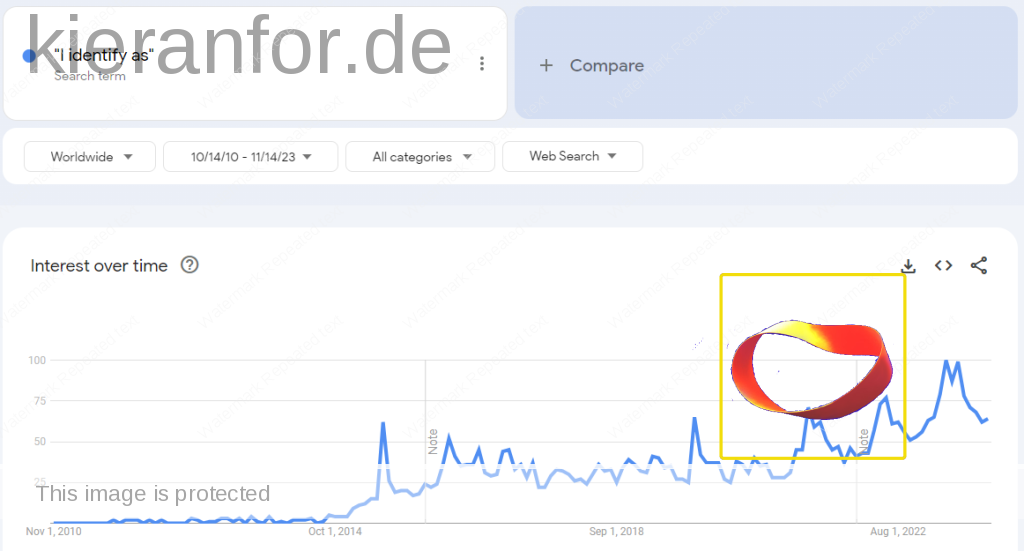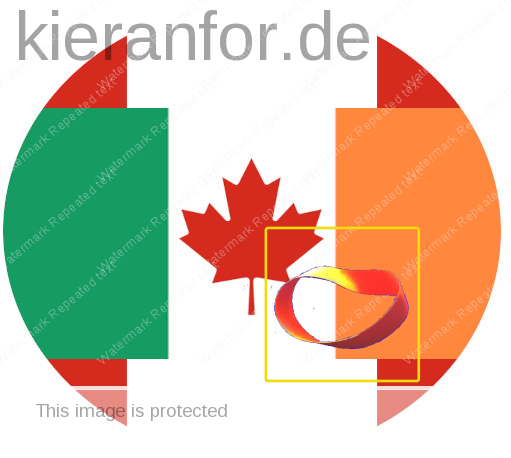Header image: ﻼF composite in GIMP
Our move to Canada was a huge decision. We’ve accomplished what we came here to do and, in the process, laid a foundation for a future here. I am close to becoming a Canadian citizen and this has given me much pause for thought.
I spent almost all of the first 21 years of my life in Ireland. When living there, I didn’t give much thought to my “Irishness”. I was born, raised, and educated there, my friends and family were there, and I had an Irish passport which meant I could come and go as I pleased.
I spent almost all of the next 21 years outside of Ireland, in Poland, Nepal, India, Vietnam, and Australia, but mostly in China. Before coming to Canada, I had spent most of my adult life in China. Arriving at the tender age of 22, I spent 13 of the following 16 years there, but I never felt Chinese nor was there a pathway to citizenship available to me had I wanted one. Even the prospect of a Greencard was extremely unlikely so I was always there on a visa and “home” was Ireland.

We’ve been in Canada for just over 6 years now and I’ve now spent more of my life outside of Ireland than I did at “home”. My approaching Canadian citizenship has me questioning a lot about the idea of self-identification and how this very term is one that was quite unfamiliar to me in the context of how people self-identify in terms of their gender and heritage.
Interestingly, a quick look at Google Trends shows that the search term “I identify as” didn’t really become commonplace until the end of 2014 but that it really took off after that.

Consider the following:
- Someone who was born and raised in Ireland and who now lives and works in Ireland. They have an Irish passport and can trace their Irish ancestry back to Brian Boru
- Someone who was born in Ireland but whose parents moved abroad shortly after they were born; they hold Irish citizenship but have never been to Ireland.
- Someone born and raised abroad and then moved to Ireland much later in life, eventually becoming a citizen.
- Someone who was born to Irish parents but raised abroad within the Irish diaspora community. They hold the passport of the other country but spent most summers in Ireland with their cousins, play Irish sport in their home country, and support Irish teams. Though they do not hold an Irish passport but they identify as being “culturally Irish”.
- Someone who was born to people of Irish heritage. They are unsure of the connection, but they know they have “Irish blood” and identify as Irish despite never having visited Ireland and not being eligible to hold an Irish passport.
- Someone who was born in Northern Ireland and is from a Nationalist background. They do not yet have either passport but are entitled to both Irish and British Passports. They identify as Irish.
- Someone who was born in Northern Ireland and is from the Unionist persuasion. They have a British passport but applied for and received an Irish passport shortly after Brexit. They explicitly reject the premise that they are Irish and identify only with their British heritage.
- Via Mr. D Murphy: “What about the 17yr old Nigerian lad trapped in some god awful direct provision centre in the midlands since his single mother claimed asylum in Dublin airport a few weeks before his 1st birthday…. Walked his 1st steps on Irish soil, plays hurling with the skills of Setanta and talks with the same flat drawl of his school pals in Drogheda – the only hometown he’s ever known…. As Irish as anyone but still fights the risk of deportation if some of the case studies I’ve heard about are to be believed!“
Of the above, who is considered Irish? Is it possible to be “more Irish than someone else?” Does someone become less Irish when they gain citizenship in another country?
The issue of self-identification specifically came to mind when I was considering Example 7 above (“William Ulsterman”). Though this person holds an Irish passport, they identify as British: who am I to question this? (What of my old dinner guest Sir Ivor Roberts?)
∞
Consider the case of gender essentialism / biological determinism, basically the belief that sex and gender are the same thing, such that biological traits are believed to be the only basis for identification. This line of argument often gets to the point where someone states “the female is XX and the male is XY”. With this line of reasoning, surely Example 1 is “more Irish” than Example 3; a DNA test will prove this.
What then if Example 1 does a DNA test only to learn that they have been adopted and are, in fact, of “Northwestern European” heritage; They now have Irish citizenship but no “Irish blood”. Should their passport be revoked? Consider the sad story of actor John Hurt who spent almost all of his life believing and feeling he was Irish, only to discover that this was not the case. You can see how devastated he is when he learns of his ancestry. One of his “bankers” has been belied.
Paraphrasing one of the comments under the video: “Only an Irishman could be that upset upon learning that he is, in fact, British”
Consider the case of Shamima Begum, a British-born woman who entered Syria to join ISIS at the age of 15, who was stripped of her British citizenship.
Does/can she self-identify as British?
In parallel, see the case of Maria José Martínez-Patiño, a woman who was discovered to have XY chromosomes and was barred from competing in women’s sports.
What of the (Mar 21, 2024) Two men swapped at birth – one Indigenous, one white – finally get apology https://www.theguardian.com/world/2024/mar/21/richard-beauvais-eddy-ambrose-switched-birth-responsibility-apology
- Richard Beauvais, 68, believed he was Indigenous. Eddy Ambrose, who shares the same birthday, always understood that he was of Ukrainian descent
- The painful saga, which embodies the damaging effects of Canada’s colonial policies, also highlights the fragile nature of identity and the complex meaning of family.
What of (July 16, 2009) Josiah Wilson, the Indian Act, hereditary governance and blood quantum?
https://www.cbc.ca/news/indigenous/josiah-wilson-indian-act-hereditary-governance-1.3668636
- Josiah Wilson, was born in Haiti, and adopted by Don Wilson, from Heiltsuk First Nation.
- Josiah says he is Heiltsuk because, ‘I have a native dad, I have a status card and I’ve been accepted by the community.’
- What, or who, defines someone as Indigenous — is it the hereditary system, the Indian Act, a blood test?
And what of this travesty:
(June 3, 2024) The violent criminals who suddenly identify as Indigenous once in prison
https://nationalpost.com/opinion/robert-jago-the-violent-criminals-who-suddenly-identify-as-indigenous-once-in-prison
∞
What about people from countries that do not allow dual citizenship? If someone born and raised in China relinquishes their Chinese passport to become a Canadian, are they no longer Chinese? Sure, they are Canadian citizens, but do they feel Canadian or do they feel Chinese (or both, or neither)? Some day soon, I will wake up an Irish citizen and go to sleep and Irish and Canadian Citizen. Will I Identify as Canadian? Perhaps an Irishman with Canadian citizenship? What if I stay here for another 20 years; will I one day feel like a Canadian with Irish Citizenship?
Surely it’s about more than just the paperwork. Self-identification must play a part but so too must mutual recognition. And more.
This is a huge topic and I am aware I am only skimming the surface. Still, it’s a start and I wanted to make it.
March 9, 2024
Definitions and terminology are crucially important. A large part of the fruitfulness of scientific thought has come from one simple fact. It is that hitherto every scientific term has had an exact definition, verbal or mathematical, universally accepted. As a result communication in scientific terms between scientists has till recently been almost completely effective. Yet, on questions of art, communication is seldom so much as half effective. There is an immense amount of noise and little else. Definitions are the only possible basis for communication and we must have them. If they cannot yet be made final we must have provisional ones.
Pye (1968) The Nature and Art of Workmanship
Q to me: Are trans women, women? Yes or no…
A from me: Are Northern Irish women, Irish women?
- By now, we’ve likely all seen people being asked “Are trans women, women?” to which the reply is often “What is a woman?” to which the reply is “Well, what do you think a woman is?”…..
- The trajectory for this engagement is a downward spiral. Invariably, terms like left/right, transphobe, woke, snowflake, pedophile, Karen, liberal, hate, freedom, bathrooms, “my right to x” etc. will enter what might have been a conversation but quickly became two people ranting from self-righteous platforms.
- A large part of this ongoing shitshow is that the definitions of terms used are not clear; they are contested +/ evoloving. Worse, people are often asked such questions and a yes/no answer is given as the only option for reply; give the “wrong” one and out comes the vilification.
- My own answer to this is my question: “Are Northern Irish women, Irish women?” There is no way to answer this with yes/no. It’s complicated and anyone discussing this in good faith must, from the outset, try to find at least something in the “other” person’s argument that is of merit.
Stanford Encyclopedia of Philosophy: Cluster concepts
Feminist Perspectives on Sex and Gender
* 3.2 Is sex classification solely a matter of biology?
https://plato.stanford.edu/entries/feminism-gender/
Leng, M. (2023). Amelioration, inclusion, and legal recognition: On sex, gender, and the UK’s Gender Recognition Act. Journal of Political Philosophy 31, 129–157. https://doi.org/10.1111/jopp.12295.
BBC video chatting to Irish immigrants about immigration restriction (1961).
https://www.reddit.com/r/ireland/comments/17zlc7q/bbc_video_chatting_to_irish_immigrants_about/
(Mar 5, 2025) Dear Suella: I was born in London and raised in Oxfordshire. What do you reckon – can I be English?
https://www.theguardian.com/commentisfree/2025/mar/05/suella-braverman-englishness-race-issues-politics-britain-minorities

